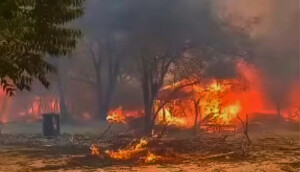EU adds voice to new appeal for human rights in Sudan
The European Union (EU) has issued a statement echoing the concerns of the UN Independent Expert on the Situation of Human Rights in Sudan, Aristide Nononsi, who concluded an 11-day mission to Sudan on 21 May. It highlights the plight of detainees such as Dr Mudawi Ibrahim.
The European Union (EU) has issued a statement echoing the concerns of the UN Independent Expert on the Situation of Human Rights in Sudan, Aristide Nononsi, who concluded an 11-day mission to Sudan on 21 May. It highlights the plight of detainees such as Dr Mudawi Ibrahim.
In his report following his mission, Nononsi commended the Government of Sudan for positive developments, but lamented human rights issues in the country that are still largely unaddressed, and urged the country to implement democratic reforms.
Among his concerns, Nononsi mentioned the detention of human rights champion Dr Mudawi Ibrahim and his driver Hafiz Idris, who have been detained by the National Intelligence and Security Service (NISS) since their arrest at the campus of Khartoum University on 7 December last year, “as I believe that they are being held solely for their legitimate work on protecting and promoting human rights in Sudan”.
The EU statement issued yesterday supports the call by Nononsi, for the immediate release of Dr Mudawi and of Hafiz Idris.
Delays in due process
“The recent presidential pardon of two pastors in Sudan is an encouraging step regarding religious freedom in the country,” the EU statement reads.
“Jan Figel, the Special Envoy for Freedom of Religion or Belief outside the EU, was able to meet with human rights defender Dr Ibrahim Mudawi in his place of detention in March 2017, yet the length of detention and delays in due process remain a source of concern.
The EU says that “despite progress in the national dialogue, space for civil society is shrinking in Sudan, as demonstrated by delays in registration of NGOs, and the arrest, detention, and court cases of human rights defenders.
"All human rights defenders need to be able to carry out their legitimate human rights activities openly, free of restrictions and without fear of reprisals”, the EU statement concludes.
Detention
Dr Mudawi Ibrahim and his driver Hafiz Idris have been in detention by the National Intelligence and Security Service (NISS) since 7 December last year.
During the first weeks, Dr Mudawi, a university professor and founder of the Sudan Social Development Organisation (SUDO), was held incommunicado in a NISS detention centre. In January, he was transferred to Kober Prison. He was not interrogated throughout his detention, until he was brought to the NISS prosecution in late February.
He embarked on a hunger strike in protest, which prompted the NISS to charge him with attempted suicide. The UN Independent Expert on the Situation of Human Rights in Sudan, Aristide Nononsi, who visited him at the prosecution office a month later, voiced his concern in a statement.
By the end of March, the prosecutor-general issued a decision to release Dr Mudawi on bail. Early May, however the attorney-general cancelled the decision.
Charges
On 11 May, the State Security Prosecution in Khartoum filed criminal charges against him, and another human rights defender, Hafiz Idris, head of the Youth Association of the North Darfur camps for the displaced, who was held during a visit to the home of Dr Mudawi Ibrahim in Omdurman in early December.
The charges include undermining of the constitutional order, inciting war against the state, espionage, inciting hatred against denominations, being members of criminal and terrorist organisations, and dissemination of false news. Some of the charges are punishable by death.
In a statement on Sunday, the family of Dr Mudawi stated that “his detention as a hostage without justification, is a clear legal and constitutional violation that deprives him of his personal freedom and from work, as well as depriving his family from living a normal life in security and peace”.
The family expressed its concern that “the authorities will try to turn his work against human rights violations into a crime”.
Earlier this year, state-controlled newspapers and websites accused Dr Mudawi of “collaborating with foreign entities”. A media outlet close to the ruling National Congress Party reportedly claimed that he is involved in an Amnesty International report released last year on the use of chemical weapons in Darfur’s Jebel Marra.











 and then
and then